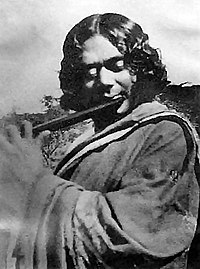| This page is currently inactive and is retained for historical reference. Either the page is no longer relevant or consensus on its purpose has become unclear. To revive discussion, seek broader input via a forum such as the village pump. |
Kazi Nazrul Islam (b. May 25, 1899 — d. August 29, 1976) was a Bengali poet, musician, revolutionary and philosopher who is best known for pioneering works of Bengali poetry. He is popularly known as the Bidrohi Kobi — Rebel Poet — as many of his works showcase an intense rebellion against oppression of humans through slavery, hatred and tradition. He is officially recognised as the national poet of Bangladesh and commemorated in India.
Born in a poor Muslim family, Nazrul received religious education and worked as a muezzin at a local mosque. He learned of poetry, drama, and literature while working with theatrical groups. After a stint in the Indian Army, Nazrul established himself as a journalist in Kolkata (then Calcutta). He assailed the British Raj and preached revolution through his poetic works, such as "Bidrohi" ("The Rebel") and "Bhangar Gaan" ("The Song of Destruction"), as well as his publication "Dhumketu" ("The Comet"). While in prison, Nazrul wrote the "Rajbandir Jabanbandi" ("Deposition of a Political Prisoner"), intensifying his criticism of imperialism. Nazrul condemned Muslim religious fundamentalism and explored the lives of downtrodden masses in India. He remained active in political organisations and literary, art, and music societies.
Nazrul's writings explore themes such as love, freedom, and revolution; he opposed all bigotry, including religious and gender. His impassioned patriotic stance (during British India) often earned him prison time. He wrote short stories, novels, and essays but is best-known for his poems, in which he pioneered new forms such as Bengali ghazals. Nazrul wrote and composed music for his nearly 3000 songs which are collectively known as Nazrul Sangeet (Nazrul songs) and widely popular today. At the age of 43 (in 1942) he began showing the signs of an unknown disease, losing his voice and memory. Suffering from Pick's Disease, as later diagnosed by Dr. Hans Hoff in Austria (Vienna), Nazrul gradually yielded to incurable mental illness, which forced him to live in isolation for many years. Invited by the Government of Bangladesh, Nazrul and his family moved to Dhaka in 1972, where he died four years later. (more...)
